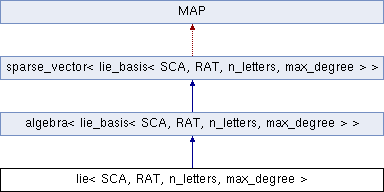A specialisation of the algebra class with a Lie basis. More...
#include <lie.h>

Public Types | |
|
typedef lie_basis< SCA, RAT, n_letters, max_degree > | BASIS |
| The basis type. | |
| typedef BASIS::KEY | KEY |
| Import of the KEY type. | |
| typedef sparse_vector< BASIS > | VECT |
| The sparse_vector type. | |
| typedef algebra< BASIS > | ALG |
| The algebra type. | |
| typedef ALG::iterator | iterator |
| Import of the iterator type. | |
| typedef ALG::const_iterator | const_iterator |
| Import of the constant iterator type. | |
Public Member Functions | |
| lie (void) | |
| Default constructor. Zero lie element. | |
| lie (const lie &l) | |
| Copy constructor. | |
| lie (const ALG &a) | |
| Constructs an instance from an algebra instance. | |
| lie (const VECT &v) | |
| Constructs an instance from a sparse_vector instance. | |
| lie (const KEY &k) | |
| Constructs a unidimensional instance from a given key (with scalar one). | |
| lie (LET letter, const SCA &s) | |
| Constructs a unidimensional instance from a letter and a scalar. | |
Friends | |
| lie | replace (const lie &src, const std::vector< LET > &s, const std::vector< lie * > &v) |
| Replaces the occurrences of letters in s by Lie elements in v. | |
Detailed Description
template<typename SCA, typename RAT, DEG n_letters, DEG max_degree>
class lie< SCA, RAT, n_letters, max_degree >
A specialisation of the algebra class with a Lie basis.
Mathematically, the algebra of Lie instances is a free Lie associative algebra. With respect to the inherited algebra class, the essential distinguishing feature of this class is the basis class used, and in particular the basis::prod() member function. Thus, the most important information is in the definition of lie_basis. Notice that this associative algebra of lie elements does not includes as a sub-algebra the associative algebra corresponding to the SCALAR type. In other words, only the scalar zero corresponds to a Lie element (the zero one) which is the neutral element of the addition operation. There is no neutral element for the product (free Lie product).
The documentation for this class was generated from the following file:
- libalgebra-demo/libalgebra/lie.h
Generated on Fri Jan 14 2011 17:50:40 for Rough Differential Equation Solver by
 1.7.1
1.7.1